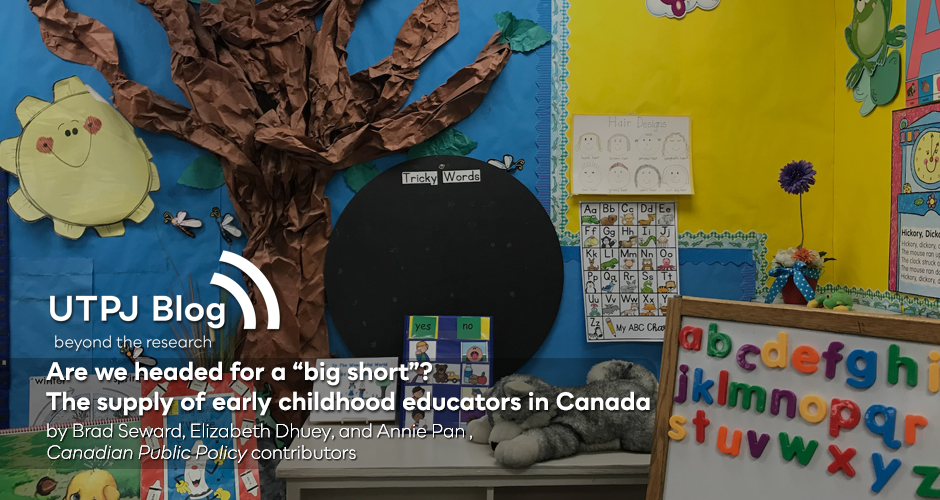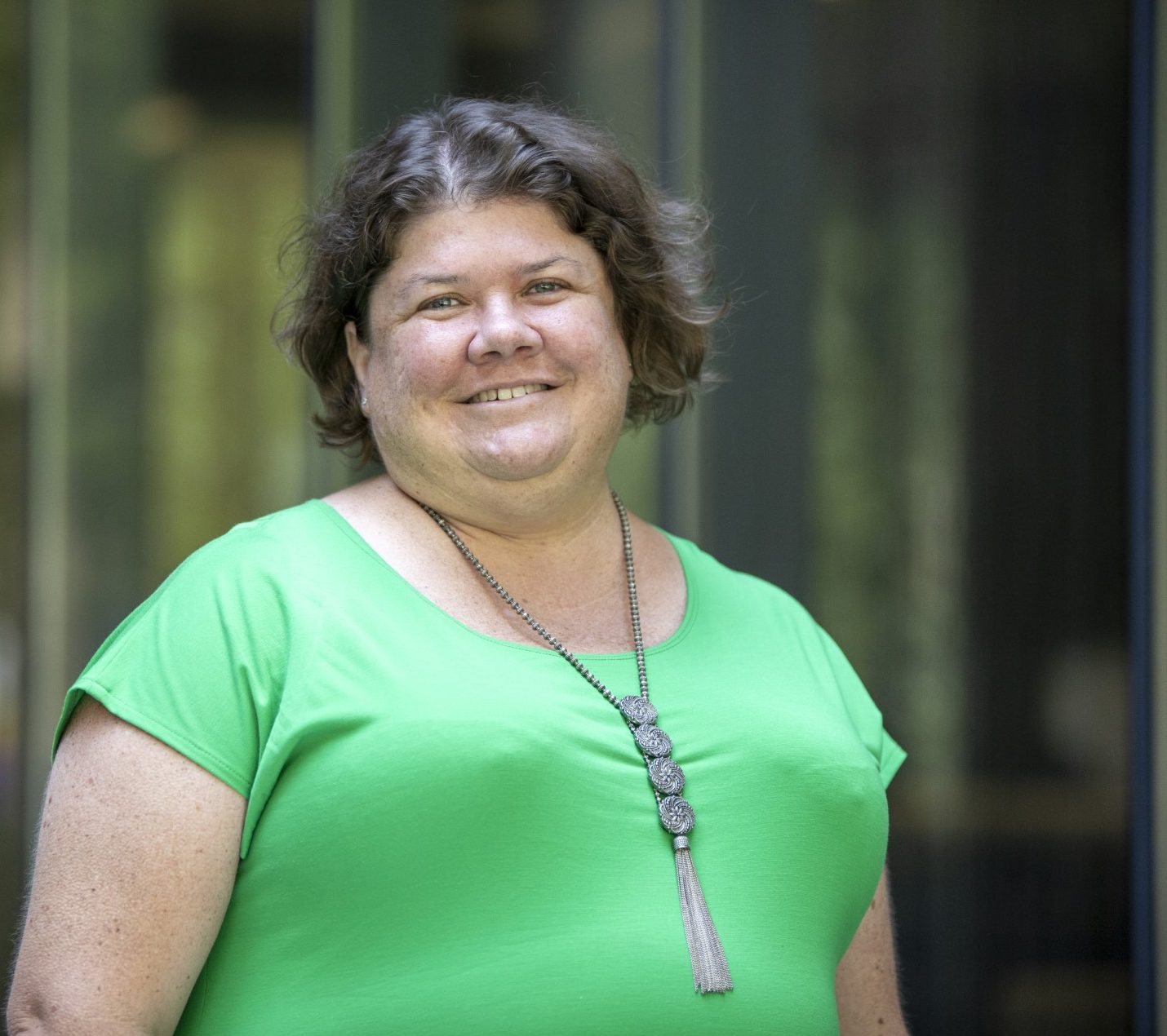
Written by guest bloggers Brad Seward, Beth Dhuey, and Annie Pan.
If you have children (or know someone who does) I won’t need to convince you that the cost of childcare is no small expense. In the past these costs could be so prohibitively expensive that some parents would need to weigh the financial trade-offs between forgoing dual-earner households to raise children, or sending their children to daycare. To ease these tensions, and to promote a more productive Canadian workforce, the federal government has invested $30 billion to provide a $10-a-day universal childcare system.
Reaching bilateral agreements with the provinces and territories has taken some time, further exacerbated by delays resulting from the pandemic, though it seems that things are back on track for this landmark achievement. The timing couldn’t be better either, with the demand for early childhood educators again growing as Canadians return to in-person work. To deliver on this promise, the new agreement aims to staff over 218,000 full time centres with roughly 43,000 early childhood educators (ECEs).
Great news, right? Well, there’s one small problem that seems to have been overlooked. Currently, the supply of new ECEs coming out of postsecondary education is woefully unprepared for this new demand. It is estimated that we’ll need roughly 23,000 new ECEs to shore up the commitment—yet we are currently only producing just over six thousand per year. With this current pattern, assuming limited cross-province mobility of recent graduates, some provinces would need up to 35 years to train enough ECEs to meet provincial requirements for qualified staff ratios.
We investigate this shortfall in our recent paper published in Canadian Public Policy using a novel administrative data linkage, The Education and Labour Market Longitudinal Linkage Platform (ELMLP). The story we find signals an Achilles heel for the new system: the majority of ECE graduates are coming from Ontario and Quebec, with a significantly smaller proportion coming from the remaining provinces. We know from demographic research that graduates tend to gravitate towards urban centres. So, with two of Canada’s major economic centres producing the largest share of graduates, and with both provinces needing the new supply, what is the likelihood that graduates will move to the other areas of Canada that need them?
On its own, this would be enough of an issue to give pause. However, when coupled with the considerably modest labour market returns that a career in ECE promises, there is little incentive for young Canadians to choose that career or to stay in the field—let alone relocate provinces for a job. To this point, we find that employment in social assistance industries (which includes staffing the ECE centres we’re talking about) tends to decay over time with movement towards other more attractive career streams. These sector exits threaten what little supply we already have, and further underscores the precarity of the issue.
Ensuring that this system will work requires a rethink of the ECE field. In addition to increasing the total number of childcare workers, the significant financial investments being made need to also prioritize improving both the quality and social standing of those jobs. At the very least, this could mean improving ECEs salaries to be more in line with provincial or national averages alongside providing indirect rewards (like benefits) that are competitive with comparable fields. At the same time, however, we’ll still need to incentivize cross-provincial mobility to prevent gaps in ECE support for those provinces that we expect will struggle to recruit and retain qualified staff.
In either case, our policy efforts need to ensure that the jobs that are created in the child care sector are perceived to be good jobs that attract qualified and passionate educators. We are at an inflection point that balances the success or failure of this universal system; our success greatly depends upon this supply, and so we need to encourage ECE program uptake for young Canadians and reinforce a viable career stream that allows graduates to remain in the sector.
 Dr. Brad Seward is an assistant professor at the Centre for Industrial Relations and Human Resources and the project director of the Research Initiative, Education + Skills (RIES). Dr. Seward received his Ph.D. in Sociology from the University of Guelph and has held positions as a Postdoctoral Research Fellow at Nipissing University, and as a Senior Human Resources Researcher at the Conference Board of Canada. Brad’s research covers a range of topics including education, skills, school to work transitions and labour market outcomes, human capital, and workplace diversity and inclusion. His work has been shared on the CBC, the Globe and Mail, 570 News Radio, and TVO’s The Agenda.
Dr. Brad Seward is an assistant professor at the Centre for Industrial Relations and Human Resources and the project director of the Research Initiative, Education + Skills (RIES). Dr. Seward received his Ph.D. in Sociology from the University of Guelph and has held positions as a Postdoctoral Research Fellow at Nipissing University, and as a Senior Human Resources Researcher at the Conference Board of Canada. Brad’s research covers a range of topics including education, skills, school to work transitions and labour market outcomes, human capital, and workplace diversity and inclusion. His work has been shared on the CBC, the Globe and Mail, 570 News Radio, and TVO’s The Agenda.
 Elizabeth Dhuey is an associate professor of economics at the University of Toronto. Her primary appointment is at the Department of Management at the University of Toronto, Scarborough. She is also non-budgetary cross-appointed to the Centre for Industrial Relations and Human Resources, the Munk School of Global Affairs and Public Policy, the Department of Economics, and the Institute of Health Policy, Management and Evaluation. Additionally, Elizabeth is an adjunct Associate Professor at the Department of Economics at McMaster University. She received her PhD (2007) in economics from the University of California, Santa Barbara. Elizabeth’s research focuses on the economics of education and has been published in top economics and education journals. It also has been widely cited by the popular press, for example in The Globe and Mail, The Wall Street Journal, The New York Times, in the book Outliers by Malcolm Gladwell and has appeared on 60 Minutes.
Elizabeth Dhuey is an associate professor of economics at the University of Toronto. Her primary appointment is at the Department of Management at the University of Toronto, Scarborough. She is also non-budgetary cross-appointed to the Centre for Industrial Relations and Human Resources, the Munk School of Global Affairs and Public Policy, the Department of Economics, and the Institute of Health Policy, Management and Evaluation. Additionally, Elizabeth is an adjunct Associate Professor at the Department of Economics at McMaster University. She received her PhD (2007) in economics from the University of California, Santa Barbara. Elizabeth’s research focuses on the economics of education and has been published in top economics and education journals. It also has been widely cited by the popular press, for example in The Globe and Mail, The Wall Street Journal, The New York Times, in the book Outliers by Malcolm Gladwell and has appeared on 60 Minutes.
 Annie Pan is an Economist at Statistics Canada. She received her PhD in Economics from the Department at the University of Waterloo, analyzing the ways in which unexpected changes in certain economic variables conditions in the legal environment, such as housing market shocks or marital policy reforms, affect the labour supply of Canadian women. Her work primarily involves gender inequality, labour market experience, and participation. Annie has formerly held a role as a research officer at the University of Toronto, and as a research analyst for CPP investments.
Annie Pan is an Economist at Statistics Canada. She received her PhD in Economics from the Department at the University of Waterloo, analyzing the ways in which unexpected changes in certain economic variables conditions in the legal environment, such as housing market shocks or marital policy reforms, affect the labour supply of Canadian women. Her work primarily involves gender inequality, labour market experience, and participation. Annie has formerly held a role as a research officer at the University of Toronto, and as a research analyst for CPP investments.
“The Big Short: Expansion of Early Childhood Education in Post-Pandemic Canada” was published in Canadian Public Policy Volume 49, Issue 3.
Comments on this entry are closed.